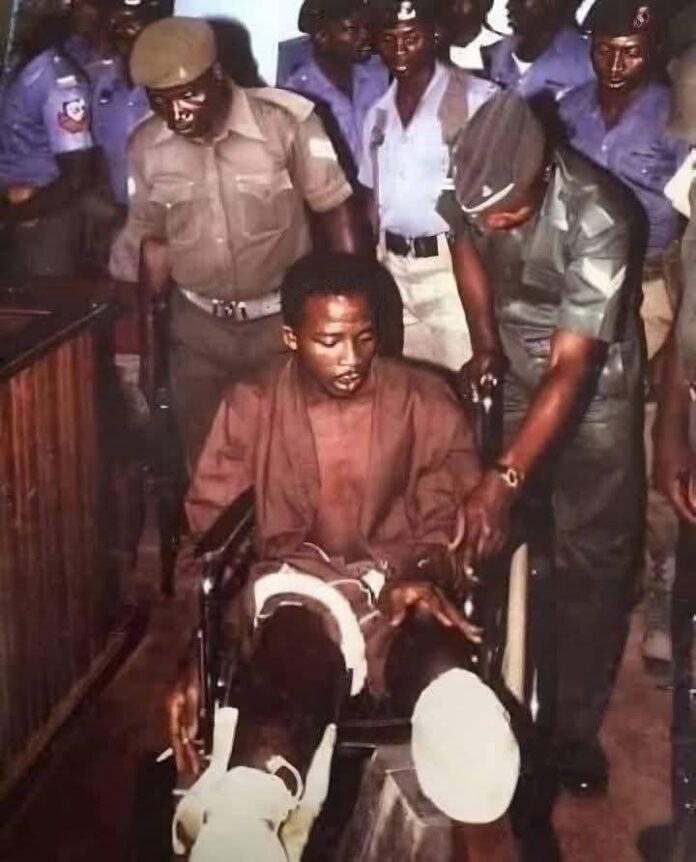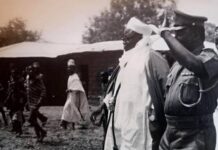Lawrence Nomanyagbon Anini: The terror of Bendel State
In the mid-1980s, the name Lawrence Nomanyagbon Anini sent shivers down the spines of Nigerians, especially those in the former Bendel State (now split into Edo and Delta States). A man with a fearsome reputation, Anini was not just an armed robber; he became a symbol of lawlessness, corruption, and the failure of justice in Nigeria. His rise and fall are among the most shocking chapters in Nigerian criminal history.
Born in the early 1960s in Benin City, Anini grew up in an era of political uncertainty and economic hardship. Not much is publicly known about his family background, but sources suggest that Anini was exposed to crime at a young age. Starting off as a driver and transport operator, he quickly became familiar with the inner workings of the criminal underworld.
By the early 1980s, Anini had moved from petty theft to armed robbery, and before long, he assembled a gang of highly dangerous men. Among them was Monday Osunbor, a loyal lieutenant with a similarly ruthless reputation, Friday Ofege, Smallie, Henry Ekponwan, Eweka and Alhaji Zed Zed or Zegezege. Together, they formed a network of robbers who operated with military-style precision and brutality.
The gang specialised in bank robberies, highway ambushes, and attacks on police stations. Their operations were mostly concentrated in Bendel State, but their influence soon spread to other parts of southern Nigeria.
What made Anini’s gang particularly terrifying was not just their success in looting but their boldness.
They often struck during the day, sometimes within walking distance of police stations. They set up roadblocks disguised as military checkpoints and they weren’t afraid to kill police officers on duty.
Over time, their crimes escalated in violence and frequency, with reports of mass shootings, bank heists, and hostage takings becoming a near-weekly affair.
The public was horrified. Fear gripped entire communities. People stopped travelling at night. Businesses shortened hours. The name “Anini” became a whispered warning.
Months passed and Anini continued to evade capture. Stories about him turned mythical. Rumours spread that he could disappear into thin air, turn into an animal, or wear charms that made him bulletproof. Some even claimed he could walk through walls.
But behind the legend was a darker truth — Anini was not a ghost. He was being protected.
It was later discovered that Anini had deep ties to the Nigerian Police Force. At the centre of this betrayal was Deputy Superintendent of Police (DSP) George Iyamu, a high-ranking officer in the Bendel State Police Command. Iyamu not only leaked information to the gang, but also supplied them with arms, helped plan their escape routes, and warned them of upcoming police raids.
This police protection allowed Anini to stay one step ahead of law enforcement, feeding the illusion of supernatural power and deepening public frustration. How could one gang operate so freely under the nose of the Nigerian state?
By late 1986, the situation had become a national embarrassment. Newspapers carried reports of Anini’s crimes almost daily. Editorials questioned the competence of the police. The fear among civilians grew so intense that even public confidence in the government began to erode.
The tipping point came when General Ibrahim Babangida, Nigeria’s military head of state at the time, publicly demanded answers. In a now-famous moment, Babangida asked the Inspector General of Police:
“My friend, where is Anini?”
That question marked a turning point.
On December 3, 1986, Anini’s luck ran out. Acting on intelligence from local informants, a special police unit led by Superintendent Kayode Uanreroro raided a house in Benin City. Inside, they found Lawrence Anini, reportedly lying on a bed with his girlfriend.
In the chaos of the raid, Anini was shot in the leg, a wound so severe that doctors later had to amputate the limb. He was finally captured alive, to the relief of a traumatised nation.
While in custody, Anini confessed to his crimes, but what shocked the country most was his exposé on police corruption. He named officers who had supported him, including DSP George Iyamu.
His revelations confirmed what many Nigerians had feared: that the criminal network wasn’t just on the streets, it was inside the very institutions meant to protect the people.
The fallout was immediate. DSP Iyamu was arrested, tried, and sentenced to death. Several others were dismissed or demoted. The Anini saga sparked reforms in the Nigerian police and led to greater scrutiny of corruption within law enforcement.
Anini’s trial was swift and public. Alongside members of his gang including Osunbor and Iyamu, Anini was found guilty of multiple counts of armed robbery and murder. On March 29, 1987, they were all executed by firing squad at Oko Prison, Benin City.
The execution was televised, serving as both justice and a warning.
For many Nigerians, Anini’s execution marked an end to a dark and terrifying chapter but the scars he left behind especially the deep distrust in law enforcement and the justice system did not end.
Today, Lawrence Anini is remembered not merely as a criminal, but as a symbol of what can happen when crime, corruption, and government failure collide. His story remains one of the most notorious episodes in Nigeria’s history.
Nearly 40 years after his fall, Lawrence Anini’s name still echoes across Nigeria, a chilling reminder of a time when fear ruled the streets, and trust in the system was all but broken.
But are we better off now?
(Sourced online)
Follow the Neptune Prime channel on WhatsApp:
Do you have breaking news, interview request, opinion, suggestion, or want your event covered? Email us at neptuneprime2233@gmail.com





